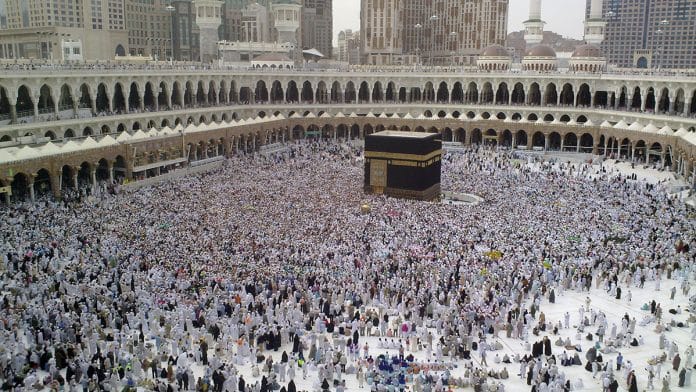New Delhi: In an unprecedented move, Saudi Arabia temporarily suspended visas for the ‘umrah pilgrimage’ to Mecca and Medina, Islam’s holiest sites, Thursday to prevent the spread of coronavirus.
As the death count for the coronavirus outbreak rose to more than 2,800 worldwide, this move also raised concerns about the fate of the Hajj, the 10-day annual pilgrimage Muslims take to the birthplace of the Prophet in Mecca in late July. ‘Umrah’ is the pilgrimage undertaken to these sites during the rest of the year.
The kingdom also suspended visas for tourists from countries with confirmed cases of the coronavirus. Saudi Arabia has not reported a single case of the virus, however, several neighbouring West Asian countries such as Iran, Kuwait and Bahrain have been affected by it. Iran has over 139 confirmed cases and 19 people have died because of the virus.
In a statement, the country’s foreign ministry noted, “The kingdom’s government has decided to take the following precautions: suspending entry to the kingdom for the purpose of umrah and visit to the Prophet’s mosque temporarily. Suspending entry into the kingdom with tourist visas for those coming from countries, in which the spread of the new coronavirus (COVID-19) is a danger.”
Also read: Coronavirus panic devastates Chinatowns from New York to Sydney
Hajj pilgrimage
The Hajj pilgrimage is the annual pilgrimage of Muslims to the city of Mecca in Saudi Arabia. It is one of five pillars of Islam and a pilgrimage all Muslims are supposed to make once in their lifetime.
This year, the pilgrimage will take place from 28 July to 2 August. It is believed that Prophet Mohammad was born in Mecca and also received the Quran from Allah there. All Muslims pray in the direction of a sacred building called the Ka’bah, which is inside the Great Mosque of Mecca.
Every year, more than two million Muslims from across the world visit Mecca for Hajj. The pilgrimage also forms a crucial source of revenue for the government.
Crown Prince Mohammed bin Salman’s Vision 2030 reform plan for Saudi Arabia was aimed at shifting the economy away from oil dependency (the country is the world’s leading crude oil exporter) to other sources of revenue, including religious tourism.
Indian Muslims are given a Hajj subsidy by Saudi Arabia, which comprises of discounted air fares, food, accommodation and insurance. In February 2019, Saudi Arabia increased India’s Hajj quota by 25,000 taking the number of Indians who can perform Hajj to 2 lakh.
Also read: It’s ok to panic about coronavirus if it’ll help stop its spread






